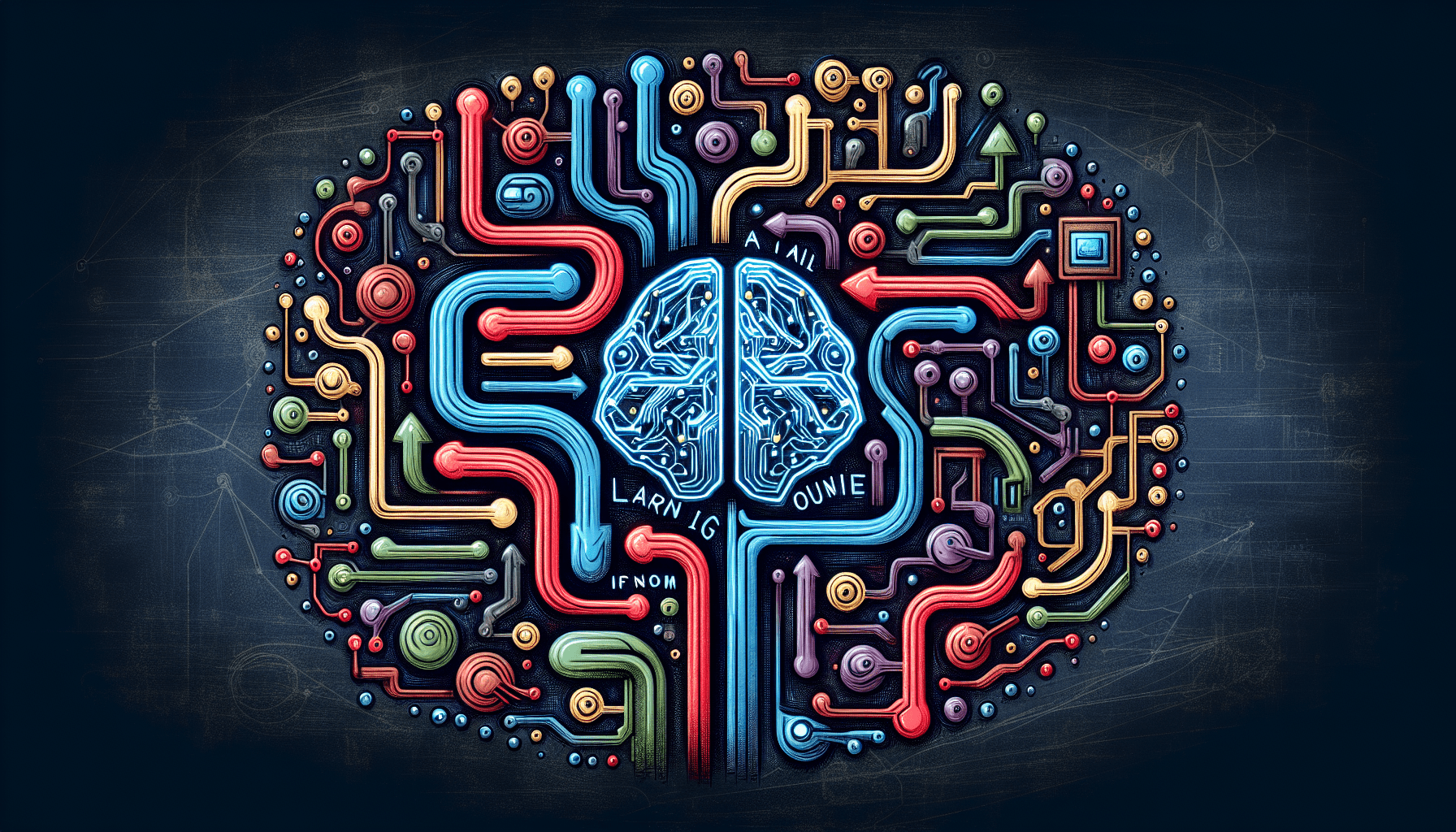Interested in learning AI the easy way? Look no further! In this article, we will share practical tips and strategies that will help you embark on your journey to mastering Artificial Intelligence. Whether you are a beginner or have some prior knowledge, these easy-to-follow tips will guide you through the process, empowering you to understand and navigate AI concepts with confidence. With our helpful suggestions, you’ll soon be on your way to becoming an AI expert! So let’s dive in and discover the practical secrets to learning AI effortlessly.

Start with the Basics
Understand What AI is
If you want to learn AI the easy way, it’s important to start with a clear understanding of what AI actually is. Artificial Intelligence refers to the development of computer systems that can perform tasks that would typically require human intelligence. These tasks include things like speech recognition, decision-making, problem-solving, and learning. By studying AI, you will gain insights into how machines can mimic human intelligence and the various techniques and algorithms used to achieve this.
Learn the Different Types of AI
Once you have a grasp of the basics, it’s essential to familiarize yourself with the different types of AI. AI can be categorized into three main types: narrow AI, general AI, and superintelligent AI. Narrow AI, also known as weak AI, is designed to perform specific tasks within limited domains. General AI, on the other hand, refers to machines that can understand, learn, and apply knowledge across a wide range of tasks, similar to human intelligence. Superintelligent AI goes beyond human-level capabilities and is purely hypothetical at this point. By understanding these distinctions, you can gain a deeper understanding of the capabilities and limitations of AI systems.
Explore AI Applications
AI applications are vast and can be seen in various fields, from healthcare and finance to entertainment and transportation. To learn AI effectively, it’s crucial to explore these different applications to gain real-world insights into how AI is used. For example, you can study AI applications in medical imaging, where AI algorithms assist in detecting diseases from medical images. By exploring these applications, you not only understand how AI is implemented but also get inspired by the potential impact it has on various industries.
Familiarize Yourself with Machine Learning
Machine Learning (ML) is a crucial component of AI, and understanding it is essential for learning AI effectively. ML refers to the ability of machines to learn and improve from experience without being explicitly programmed. There are different types of ML algorithms, such as supervised learning, unsupervised learning, and reinforcement learning. Supervised learning involves training a model with labeled data, while unsupervised learning involves finding patterns in unlabeled data. Reinforcement learning focuses on training models through interaction with an environment. By familiarizing yourself with ML, you’ll develop a strong foundation for AI and understand the techniques behind many AI applications.
Get a Strong Foundation in Programming
Learn a Programming Language
To dive deeper into AI, you need to have a solid understanding of programming. Python, with its simplicity and extensive libraries for AI, is a recommended language to start with. Python allows you to implement AI algorithms, build models, and work with large datasets. Learning the fundamentals of Python will provide you with a powerful toolset for AI development. Additionally, understanding other programming languages like Java or C++ can be beneficial as they are widely used in AI research and development.
Master the Fundamentals of Data Structures and Algorithms
Data structures and algorithms are the building blocks of programming and play a crucial role in AI. By mastering the fundamentals, you’ll be able to efficiently manipulate and process data, which is essential for AI tasks. Understanding concepts such as arrays, linked lists, stacks, queues, and trees will help you optimize your AI algorithms and improve their performance. Additionally, learning algorithms like sorting, searching, and graph algorithms will enable you to solve complex AI problems effectively.
Practice Problem-Solving Skills
Problem-solving is a key skill in AI. To become proficient in AI, you should consistently practice solving computational problems. Platforms like LeetCode and HackerRank provide a wide range of coding challenges that can help you enhance your problem-solving skills. By regularly tackling different problems, you’ll develop the ability to think critically, break down complex tasks, and design efficient algorithms. This hands-on practice will build your confidence and prepare you for AI challenges.
Get Hands-on Experience with Coding
Theory alone won’t make you an expert in AI. It’s crucial to apply what you’ve learned through practical coding experience. Start by implementing small AI projects and gradually work your way up to more complex ones. This hands-on approach will give you a deeper understanding of AI concepts, algorithms, and their real-world applications. Additionally, by working on coding projects, you’ll encounter and overcome common challenges, strengthening your problem-solving skills and expanding your knowledge.
Study Mathematics and Statistics
Brush Up on Linear Algebra
Linear Algebra forms the backbone of many AI algorithms. Understanding concepts like matrix operations, vectors, and eigenvectors is essential for various AI tasks such as data transformation, dimensionality reduction, and optimization algorithms. By brushing up on your linear algebra skills, you’ll be able to grasp the underlying math behind AI models and algorithms, enabling you to better analyze and implement them.
Learn Calculus
Calculus plays a crucial role in various areas of AI, especially in optimization algorithms and machine learning. Concepts such as derivatives, integrals, and gradients are essential for understanding how AI models are trained and updated. Additionally, understanding calculus will help you interpret and evaluate the performance of AI models using metrics like gradients and loss functions. By learning calculus, you’ll gain a deeper understanding of the mathematical foundations of AI.
Understand Probability and Statistics
Probabilistic reasoning and statistical analysis are vital in AI, particularly in areas such as decision-making, inference, and data modeling. Understanding concepts such as probability distributions, hypothesis testing, and Bayesian inference will enable you to analyze and interpret data effectively. Moreover, statistical techniques like regression and hypothesis testing are crucial for evaluating AI models and making data-driven decisions. By strengthening your knowledge of probability and statistics, you’ll be equipped with the tools to handle uncertainty and make informed AI decisions.
Take Online Courses and Tutorials
Enroll in Introductory AI Courses
Online platforms like Coursera, edX, and Udacity offer a wide range of introductory AI courses that cater to learners of all levels. These courses provide comprehensive lessons on AI concepts, machine learning algorithms, and practical applications. By enrolling in well-structured AI courses, you’ll have access to video lectures, assignments, and quizzes that will help solidify your understanding of AI. Additionally, these courses often include hands-on projects, giving you the opportunity to apply AI techniques in real-world scenarios.
Follow Online Tutorials and Guides
In addition to formal courses, the internet offers a wealth of free tutorials and guides that can help you learn AI at your own pace. Websites like Medium, Towards Data Science, and Kaggle provide tutorials on a wide range of AI topics. These tutorials often contain step-by-step instructions, code examples, and explanations of AI concepts. By following these tutorials, you’ll gain practical knowledge and learn from experienced AI practitioners.
Participate in Online AI Communities
Online AI communities can provide valuable support and resources for learning AI. Platforms like Reddit, Stack Exchange, and AI-specific forums allow you to engage with AI enthusiasts, professionals, and researchers. By actively participating in discussions, asking questions, and sharing your knowledge, you’ll be able to learn from others, gain insights into AI best practices, and stay updated with the latest developments in the field. These communities also often organize virtual meetups, webinars, and hackathons, offering additional learning opportunities and networking possibilities.

Join AI Study Groups or Bootcamps
Collaborate with Peers
Joining AI study groups or bootcamps allows you to collaborate with like-minded individuals who are also passionate about learning AI. These groups provide a supportive environment where you can share your progress, discuss challenging concepts, and work on projects together. By collaborating with peers, you’ll be exposed to different perspectives, learn from each other’s experiences, and deepen your understanding of AI through interactive discussions.
Participate in Group Projects
One of the best ways to enhance your AI skills is by working on group projects. Collaborating with others on AI projects allows you to learn from different approaches and gain exposure to different problem-solving techniques. By dividing tasks and working together, you can tackle more complex projects and improve your ability to apply AI concepts in a practical setting. Group projects also provide an opportunity to strengthen your teamwork and communication skills, which are valuable in real-world AI settings.
Benefit from Mentorship Programs
Mentorship programs can provide invaluable guidance and support in your AI learning journey. Look for experienced AI professionals or researchers who are willing to mentor aspiring learners. A mentor can provide you with personalized advice, review your projects, and offer insights into the industry. The guidance of a mentor can accelerate your learning, help you avoid common pitfalls, and provide opportunities for networking and career growth.
Work on Real-world AI Projects
Find Open Source AI Projects
Contributing to open-source AI projects is an excellent way to gain practical experience and make meaningful contributions to the AI community. Platforms like GitHub host numerous AI-related repositories where you can find projects to work on. By studying and contributing to existing projects, you’ll learn from experienced developers, gain insights into real-world AI implementations, and improve your coding skills. Additionally, working on open-source projects allows you to build a portfolio that showcases your AI expertise to potential employers and collaborators.
Contribute to Existing AI Initiatives
Apart from open-source projects, many AI initiatives and organizations welcome contributions and collaborations. Look for AI-related initiatives in fields that interest you, such as healthcare, climate change, or social good. By contributing to these initiatives, you’ll not only apply your AI skills to solve real-world problems but also make a positive impact on society. Collaborating with experts in these initiatives can also provide valuable learning experiences and networking opportunities in your chosen domain.
Build Your Own AI Applications
Once you have gained proficiency in AI, consider building your own AI applications. Identify a problem or a domain that interests you and develop an AI solution from scratch. This hands-on experience will allow you to apply all the knowledge and skills you have acquired throughout your learning journey. By building your own AI applications, you’ll gain a deeper understanding of the end-to-end AI development process, from data acquisition and preprocessing to model training and deployment. It also serves as a valuable portfolio piece that demonstrates your ability to create practical AI solutions.

Stay Updated with AI Developments
Follow AI Blogs and Websites
Staying up to date with the latest AI developments is essential to remain current in the field. Follow reputable AI blogs and websites such as “AI News,” “Towards Data Science,” and “AI Trends.” These sources provide insights into recent advancements, breakthrough research, and emerging technologies. By regularly reading AI blogs and websites, you’ll stay informed about the evolving landscape of AI and gain knowledge that can be applied to your own projects.
Read Research Papers and Publications
Research papers and publications are key sources of cutting-edge AI knowledge. Platforms like arXiv and Google Scholar allow you to access a vast collection of research papers across various AI subfields. Reading research papers will expose you to the latest algorithms, techniques, and theories proposed by researchers. While some papers may be challenging to understand, picking papers relevant to your interests and gradually increasing the complexity will help you expand your understanding of AI and stay at the forefront of the field.
Attend AI Conferences and Events
AI conferences and events offer unique opportunities to learn from experts, network with professionals, and gain insights into the latest trends. Look for conferences such as Neural Information Processing Systems (NeurIPS), International Conference on Machine Learning (ICML), and AI Summit. Attending these events will expose you to cutting-edge research, industry best practices, and real-world AI applications. Additionally, many conferences offer workshops, tutorials, and hands-on sessions that allow you to enhance your skills and knowledge in specific AI domains.
Practice Data Analysis and Preprocessing
Acquire and Clean Datasets
Data analysis is a fundamental aspect of AI, and acquiring and cleaning datasets is often the crucial first step. Explore platforms like Kaggle, UCI Machine Learning Repository, and OpenML for publicly available datasets. Acquire datasets that align with your interests or projects and ensure they are reliable, relevant, and properly labeled. Data cleaning involves removing errors, duplicates, and inconsistencies from the acquired data to ensure its quality and integrity. By practicing data acquisition and cleaning, you’ll learn the nuances of working with real-world data.
Perform Exploratory Data Analysis
Once you have acquired and cleaned your datasets, it’s important to perform exploratory data analysis (EDA). EDA involves examining and visualizing the data to uncover patterns, relationships, and potential outliers. Utilize Python libraries such as pandas, NumPy, and matplotlib to explore the datasets and gain insights. EDA helps you understand the characteristics of the data, identify missing values, and decide on appropriate preprocessing techniques. By practicing EDA, you’ll develop the skills necessary to make informed decisions when working with data for AI projects.
Master Data Preprocessing Techniques
Data preprocessing is a critical step in preparing data for AI tasks. Techniques such as feature scaling, handling missing values, encoding categorical variables, and dimensionality reduction help optimize the data for AI algorithms. Understand the different data preprocessing techniques and when to apply them based on the characteristics of the dataset and the requirements of your AI task. By mastering data preprocessing techniques, you’ll ensure that your data is appropriately transformed and ready for model training, resulting in more accurate and robust AI models.

Implement Machine Learning Algorithms
Understand Supervised and Unsupervised Learning
Machine learning algorithms can be broadly categorized into supervised learning and unsupervised learning. In supervised learning, models are trained on labeled data, where the input features and corresponding target variables are known. Examples include regression and classification tasks. In unsupervised learning, models analyze unlabeled data to identify patterns or groupings without any predefined output labels. Techniques like clustering and dimensionality reduction fall under unsupervised learning. Understanding the differences between supervised and unsupervised learning is crucial for selecting the appropriate algorithms for your AI tasks.
Implement Regression and Classification Models
Regression and classification are two fundamental tasks in machine learning. Regression models aim to predict continuous numerical values, while classification models predict discrete class labels. Algorithms like linear regression, logistic regression, decision trees, and support vector machines are commonly used for regression and classification. By implementing these models, you’ll gain hands-on experience in training, evaluating, and fine-tuning models for different types of predictive tasks.
Experiment with Deep Learning Techniques
Deep Learning is a subset of machine learning that focuses on neural network models with multiple layers. Deep Learning has gained popularity due to its ability to process large amounts of data and solve complex problems such as image recognition and natural language processing. Popular deep learning frameworks like TensorFlow and PyTorch offer a wide range of pre-built neural network architectures and tools. By experimenting with deep learning techniques, you’ll develop a deeper understanding of neural networks and be able to tackle more sophisticated AI tasks.
Stay Curious and Keep Learning
Stay Updated with New AI Technologies
AI is a rapidly evolving field, with new technologies and frameworks emerging regularly. Stay curious and keep yourself updated with the latest AI technologies, tools, and libraries. Explore emerging areas like Generative Adversarial Networks (GANs), Reinforcement Learning, and Natural Language Processing (NLP). By continually learning and trying out new technologies, you’ll expand your AI skill set and stay ahead in the ever-evolving AI landscape.
Seek Continuous Learning Opportunities
Learning AI is a lifelong journey, and it’s crucial to seek continuous learning opportunities. Apart from online courses and tutorials, consider attending workshops, seminars, and AI-related meetups in your community. Join AI-related groups on social media platforms and actively engage with experts and practitioners. Consistently challenging yourself and seeking new knowledge will ensure that you stay motivated, expand your AI expertise, and keep up with the advancements in the field.
Experiment and Innovate with AI
Learning AI is not just about acquiring knowledge; it’s about applying that knowledge to create meaningful solutions and innovations. Embrace a mindset of experimentation and innovation by continuously seeking opportunities to apply AI to real-world problems. This could involve initiating AI projects, starting collaborations, or exploring entrepreneurial ventures. By actively experimenting and innovating, you’ll not only deepen your understanding of AI but also make valuable contributions to the field and potentially shape the future of AI.
In conclusion, learning AI the easy way requires a systematic approach that covers the basics, programming skills, mathematics, hands-on experience, and staying updated with the latest developments. By following the outlined steps, you’ll be equipped with the necessary knowledge and skills to embark on a successful and fulfilling AI learning journey. Remember to stay curious, keep learning, and most importantly, have fun exploring the fascinating world of AI!







Leave a Reply